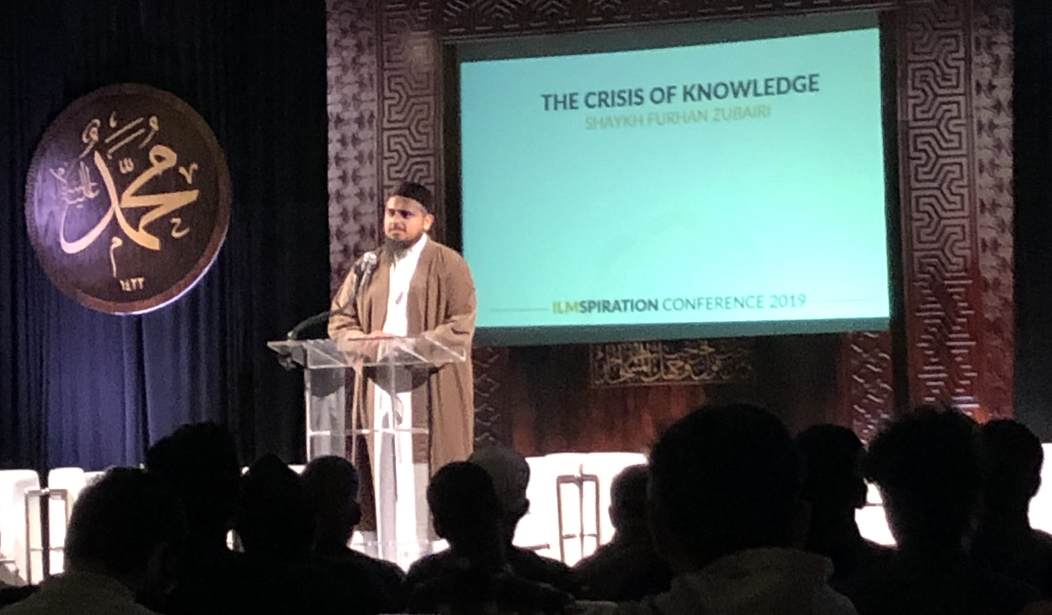To really come to understand current trends within modern Islamist ideology, few experiences can compete with attending Islamist conventions and listening to its leading clerics.
At last year’s “ILMspiration” Conference held in Anaheim, California, a day-long event on September 21, 2019, three speakers dominated the day, each receiving two or even three speaking spots. The Institute of Knowledge (IOK), a Deobandi Islamist seminary, hosted the event, which brought together Islamist scholar-activists from two other prominent institutions, the Yaqeen Institute for Islamic Research and the Qalam Institute. The founders of these other two organizations – Omar Suleiman and Abdul Nasir Jangda – delivered fast-paced, intellectually challenging speeches. In addition, representing IOK was Dean of Academics Furhan Zubairi, a rising leader in the Southern California Islamist community.
Cumulatively, the three leaders’ talks provided important clarity about current Islamist thought and its perceived obstacles. The first session of the day was titled “Knowledge and the Knowledgeable: Who Speaks for Islam?” Zubairi started with a speech on “The Crisis of Knowledge,” in which he defined the conflict as between “two very, very different worldviews” – a single Islamic perspective in opposition to a single Western perspective, rather than acknowledging the variety of ideas that compete both within Islam and within the West.
He warned his audience of the pervasive effect of Western ideas: “Whether we like to admit it or not,” he said, “we are heavily influenced by the society and culture that we live. Especially the school systems that most of us are products of.”
Zubairi then elucidated the consequences of this conflict – that Western conceptions of liberty, freedom, justice, mercy, and fairness, become “problematic” when applied to Islam: “We cannot use our flawed, human understandings of these concepts and apply them to the Quran.” And that includes subjects about which the West has been certain for a long time: “… why has Islam just regulated but not banned slavery? And this is a real question that people have because they have been cultured to think that freedom is one of the greatest ideals of human life. And it is. But our understanding of freedom has to be the understanding that is given to us by Allah…”
Jangda spoke next in a talk titled “The Need to Study” and again in the afternoon on how “It Takes a Village.” In both speeches, he blasted and caricatured the central importance of the individual in the moral values of the West, while lauding the collectivist nature of his strain of Islam.
Jangda warned against the idea of “self-taught” Quranic study, insisting that one could only learn through a teacher. This rule provides two noticeable benefits: that Islamists maintain control over theological interpretations, and that it offers an easy way to dismiss critics of Islamism on the grounds that they were falsely taught.
Jangda went even further in his war against individualism. As the IOK conference took place on the second floor of the Anaheim Hilton, another event took place across the hall, featuring Shark Tank’s Daymond John and offering guidance on entrepreneurship. Apparently going off script, Jangda insisted, “nobody is a ‘self-made millionaire.’ You were born with that written to your name. You didn’t make nothing. What you made, all you are, is you are an observation of what we like to call ‘dumb luck.’ Alright? That’s all it is… And now people talk about being ‘self-taught’ as if that was something admirable or praiseworthy. It’s ridiculous.”
Later in the day Jangda would make a similar point when talking about military battles under Muhammad’s rule: that the victor and the loser were chosen by Allah. He applied the idea to himself too, saying “Any good that I am able to do, I can never take any credit for onto myself. I cannot congratulate myself… I am only in this position because Allah put me in this position…”
Jangda later continued his assault on the individual: “There’s this very popular idea and notion that particularly came very predominant within the postmodern world about people being individuals.” The idea that postmodernism birthed individualism is absurd. And two millennia of thinkers and readers of the Greco-Roman tradition, the Renaissance, the Reformation, the Enlightenment, our nation’s founders, the Constitution may well disagree.
Jangda also linked individualism with emotional autarky, warning of “… people being able to live life on their own. ‘I don’t want to need anyone. I want to be able to be completely self-sufficient.’ And that is completely unrealistic. Not needing anyone and being able to live life without any emotional attachments is, and not to throw this word around lightly, but that is actually some kind of disfunction within the person. That is a disorder… Every single person needs a community… It is what we need as believers. We need to be part of a collective and a community. Never think of yourself above it.”
The final sentence makes clear where Jangda stands: in Islamism, the individual must submit to the will of the collective.
Suleiman would also echo these ideas, quoting Mohammed that “Shaytan [Satan] preys on the lone sheep, the sheep that’s away from the flock.” Suleiman insisted that “do not become divided amongst yourselves. Allah’s blessing is always with the group.”
Suleiman’s first speech, “Islam & The ‘-isms,’” was particularly explicit: “If you are trying to shape your Islam in accordance with the other isms, you already have a problem. If it is genuine religion and authentic, then you have to give it room to form independent of all those other isms and reduce them to noise in the background without ignoring the real problems that they speak to.”
By rejecting all other “isms” as “noise” then Islam itself becomes an “ism” too, thus Islamism reveals itself.
David M. Swindle is a fellow for Islamist Watch and the Southern California associate of the Counter-Islamist Grid. He also works as the Director of Research for The Israel Group. Follow him on Twitter @DaveSwindle









Join the conversation as a VIP Member